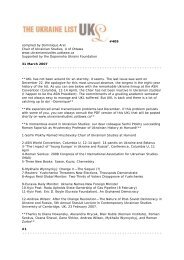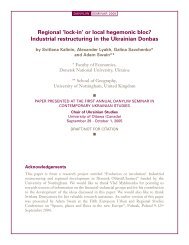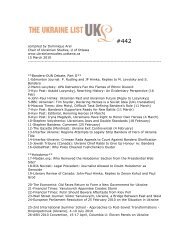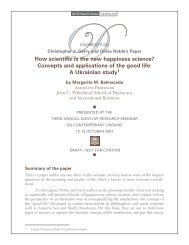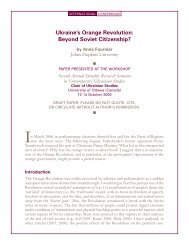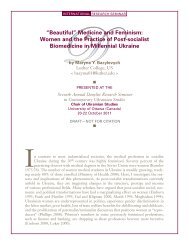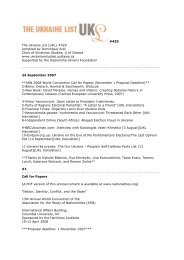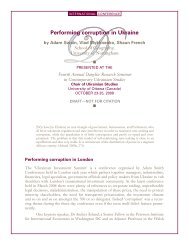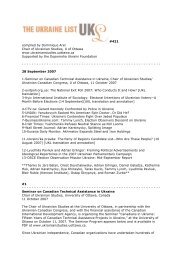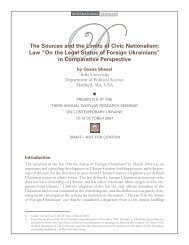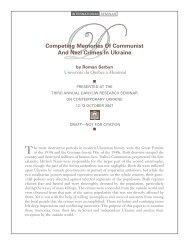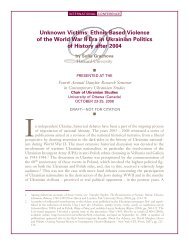Citizenship and nation-building in Ukraine - Chair of Ukrainian Studies
Citizenship and nation-building in Ukraine - Chair of Ukrainian Studies
Citizenship and nation-building in Ukraine - Chair of Ukrainian Studies
Create successful ePaper yourself
Turn your PDF publications into a flip-book with our unique Google optimized e-Paper software.
INTERNATIONAL CONFERENCE<br />
conception <strong>in</strong> the law. The def<strong>in</strong>ition <strong>of</strong> the <strong>of</strong>ficial <strong>nation</strong> by the territory <strong>of</strong> the state<br />
can thus be described as “civic <strong>nation</strong> by default” (rather than by design). Let us exam<strong>in</strong>e<br />
the evidence on which these conclusions are based, <strong>and</strong> consider what this evidence<br />
reveals about the larger process <strong>of</strong> state <strong>and</strong> <strong>nation</strong>-<strong>build<strong>in</strong>g</strong> <strong>in</strong> Ukra<strong>in</strong>e.<br />
The Ukra<strong>in</strong>ian right <strong>and</strong> the citizenship question.<br />
The <strong>nation</strong>al question <strong>in</strong> the post-Soviet Ukra<strong>in</strong>e has been contested <strong>in</strong>tellectually <strong>and</strong><br />
politically between the right <strong>and</strong> the left who embrace mutually exclusive myths <strong>of</strong><br />
<strong>nation</strong>al orig<strong>in</strong> <strong>and</strong> conflict<strong>in</strong>g objectives for the future <strong>of</strong> the Ukra<strong>in</strong>ian statehood. Until<br />
its split <strong>in</strong> 1999, Rukh was the ma<strong>in</strong> political force on the right. The view <strong>of</strong> the right on<br />
the state <strong>and</strong> the <strong>nation</strong> is close to a traditional ideal <strong>of</strong> a modern <strong>nation</strong>-state.<br />
Proponents <strong>of</strong> this view see today’s Ukra<strong>in</strong>e as the state <strong>of</strong> the Ukra<strong>in</strong>ian <strong>nation</strong> <strong>in</strong> the<br />
same way that Pol<strong>and</strong> is the state <strong>of</strong> the Polish <strong>nation</strong> or Germany the state <strong>of</strong> the<br />
German <strong>nation</strong>. The right emphasizes the historicity <strong>of</strong> Ukra<strong>in</strong>e’s statehood by trac<strong>in</strong>g<br />
its political l<strong>in</strong>eage from the Kievan Rus, to the Cossack republic <strong>of</strong> the 17 th century, <strong>and</strong><br />
the brief period <strong>of</strong> <strong>in</strong>dependent statehood <strong>in</strong> 1917-1921. At the heart <strong>of</strong> the right’s view<br />
on the Ukra<strong>in</strong>ian <strong>nation</strong> <strong>and</strong> the Ukra<strong>in</strong>ian state is the emphasis on Ukra<strong>in</strong>e’s <strong>and</strong><br />
Ukra<strong>in</strong>ians’ dist<strong>in</strong>ctiveness, first <strong>and</strong> foremost from Russia <strong>and</strong> the Russians. Russia is<br />
presented as the ma<strong>in</strong> “other” aga<strong>in</strong>st which Ukra<strong>in</strong>ian identity is def<strong>in</strong>ed, an occupy<strong>in</strong>g<br />
empire (tsarist <strong>and</strong> later Soviet) from which Ukra<strong>in</strong>e’s <strong>in</strong>dependence was f<strong>in</strong>ally rega<strong>in</strong>ed<br />
<strong>in</strong> 1991.<br />
For the ma<strong>in</strong>stream right, Ukra<strong>in</strong>e is a democratic political community where the<br />
rights <strong>of</strong> <strong>nation</strong>al m<strong>in</strong>orities are upheld, but where the “the core” <strong>of</strong> the Ukra<strong>in</strong>ian political<br />
<strong>nation</strong> is the Ukra<strong>in</strong>ian ethnos. This view was elaborated by Rukh’s program already<br />
<strong>in</strong> the late Soviet period. Specifically, Rukh concluded that,<br />
“the <strong>nation</strong>al question <strong>in</strong> Ukra<strong>in</strong>e is about the development <strong>of</strong> the Ukra<strong>in</strong>ian<br />
<strong>nation</strong>, ethnic groups <strong>and</strong> <strong>nation</strong>al m<strong>in</strong>orities, their <strong>in</strong>tegration <strong>in</strong>to a common<br />
social fabric (socium) <strong>of</strong> the republic the core <strong>of</strong> which are the people that gave the<br />
name to their <strong>nation</strong>-state.” 12<br />
For the right, the answer to the question “who belongs to the Ukra<strong>in</strong>ian <strong>nation</strong>”<br />
was thus rather straightforward. If Ukra<strong>in</strong>e is conceived as a democratic multi<strong>nation</strong>al<br />
state, all residents <strong>of</strong> Ukra<strong>in</strong>e can be considered belong<strong>in</strong>g to the political Ukra<strong>in</strong>ian<br />
<strong>nation</strong>, while ethnic Ukra<strong>in</strong>ians outside Ukra<strong>in</strong>e, by virtue <strong>of</strong> their membership <strong>in</strong> the<br />
ethnic Ukra<strong>in</strong>ian <strong>nation</strong> that is the “core” if the state, must also be <strong>in</strong>cluded <strong>in</strong> the defi-<br />
12. Narodnyi Rukh Ukra<strong>in</strong>y za Perebudovy 1989, 18.<br />
5



